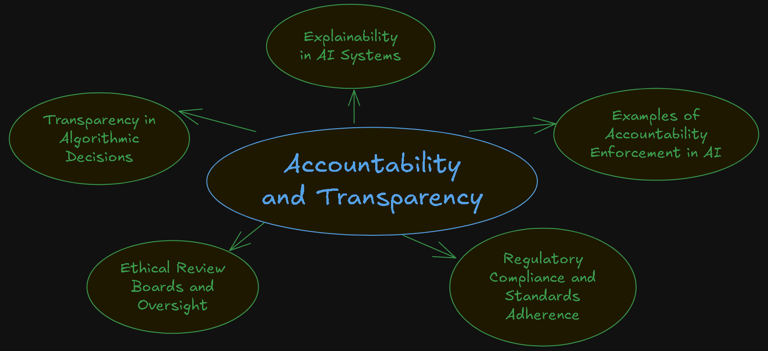Unveiling the Human Touch: Navigating Ethical AI
Memory Matters #4


A concern with relation to Ethical AI is the issue of algorithm bias. In various areas, such as hiring processes, loan approvals, and criminal justice systems, AI has the ability to reinforce and intensify pre existing biases. By comprehending this problem and tackling it directly, we can emphasize the importance of human involvement in AI by promoting fairness and transparency in algorithmic decision-making.
Concerns about bias in algorithms have become increasingly prominent in the field of artificial intelligence. The algorithms have the potential to result in unjust or biased consequences, furthering existing disparities in society. Addressing bias in algorithms is of utmost importance to guarantee that AI systems make decisions that are fair, transparent, and inclusive.
We are now living in a time where machines can replicate human cognitive abilities, make independent choices, and communicate with us using natural language. Although these capabilities have brought about a multitude of opportunities, they have also given rise to important ethical considerations which will be important to discuss both now and in the future.
Bias and fairness
AI systems are frequently trained using historical data, which has the potential to mirror societal biases. These outcomes could be discriminatory, particularly in societal news updates, hiring, lending, and law enforcement. Ensuring equitable outcomes and preventing discriminatory practices in artificial intelligence are of utmost importance. Understanding the importance of fairness in algorithmic decision-making is essential for the companies who influence the programmer to invoke their own ethical element of the puzzle.
Thoroughly examining the training data for biases related to race, gender, or other sensitive attributes is crucial requiring identification and removal of any biased data points that may impact the algorithm's decision-making process. Adding a touch of randomness to the weight based algorithmic process is necessary to give it a more natural feel. By incorporating diverse viewpoints and backgrounds, the algorithm can make fairer decisions.
Regular audits of algorithms are essential for detecting and mitigating bias. One aspect of this role is to carefully examine the results of the algorithm in order to detect any discrepancies that may exist between various demographic groups. This type of auditing may be too much overhead for many and if not handled earlier in the sequence, it may never get addressed.
Privacy and data security
The proliferation of AI has led to massive amounts of data being collected, raising concerns about the privacy and security of individuals' information. Privacy is another pivotal aspect of the ethical use of AI. As AI systems collect and analyze vast amounts of personal data, there's a pressing need to safeguard individuals' privacy. By prioritizing privacy-preserving techniques and advocating for clear consent and data protection measures, we can humanize AI and instill trust in its applications.
Sensitive personal data can be exploited by unfair algorithms, leading to privacy breaches and the potential misuse of individuals' information. It seems common today where you get a letter or email stating that your personal data has been exposed through various hackings. This can result in unauthorized profiling, discrimination, and the erosion of privacy rights. When privacy is not adequately preserved, individuals may be unaware of how their data is being utilized, leading to a lack of agency and control over their personal information.
While in today's environment, the effect of AI use has exploded, individuals may become reluctant to engage with AI systems in the future if they perceive that their privacy, IP or copywritten information is not adequately protected, leading to a loss of valuable insights and participation. Failure to preserve privacy in AI applications may lead to legal repercussions, regulatory fines, and reputational damage. Upholding privacy principles in AI development and deployment is essential for fostering trust, respecting individuals' rights, and advancing responsible AI innovation.
Accountability and transparency
As AI systems become more autonomous, it becomes challenging to determine who is accountable for their decisions. The concept of accountability in AI involves holding both the technology and its creators responsible for the outcomes of AI-driven decisions. Incorporating mechanisms for traceability and explainability in AI systems is crucial to instill confidence and ensure that the human element remains at the forefront of AI development and deployment.
Some measures to achieve accountability in AI systems consist of:
By emphasizing the above with regards to AI systems, accountability can be effectively enforced, contributing to the responsible and ethical integration of AI technologies in diverse applications.
Infusing the human touch with AI
In order to effectively address ethical concerns in AI, it is essential to incorporate a "human touch" into AI systems. This requires incorporating ethical considerations, empathy, and human-centered values into their design and implementation - difficult but important to consider against current project timelines and ever changing program needs. When considering the ethical implications, it is crucial to highlight the importance of humanizing AI. This involves incorporating human values, empathy, and a comprehensive understanding of various human experiences into AI systems. Im not sure how we will be able to do this however it will be an important role in companies moving forward.
Advocating for the advancement of AI that embodies our shared humanity is crucial in order to ensure that AI is used for positive purposes, in line with our ethical principles and societal goals.
Ethical Frameworks
Developing and adhering to ethical frameworks is crucial for guiding the development and deployment of AI systems. These frameworks should prioritize fairness, transparency, accountability, and the protection of privacy. Fairness in algorithms ensures equitable treatment for all individuals, regardless of sensitive attributes. There will be many that want to game this situation where an established framework would help. Ethical guidelines and standards should consist of both fairness and transparency in order to provide the best response with regard to AI tool output. The establishment of an ethical review board should include thorough oversight to oversee AI algorithm development and deployment, ensuring that ethical considerations are rigorously addressed.
Connecting with the Next Generation
Understanding and promoting awareness of the ethical implications of AI is of utmost importance. Through facilitating conversations, fostering analytical thinking, and emphasizing the importance of ethical considerations in the development of AI, we can cultivate a strong sense of responsibility in future technologists. In the future, it is crucial to implement measures that ensure AI accountability while also incorporating elements of personality and humanity.
Promoting diversity in AI development teams and ensuring the inclusion of various perspectives will help mitigate biases and ensure that AI systems cater to the needs of all societal segments. Advocating for responsible AI use should be a key message to the youth regarding future education.
Conclusion
Without a doubt, AI is changing the world, but this potential needs to be used properly with guidelines. We can negotiate the ethical ramifications, make sure AI systems reflect our values, and help create a more just and inclusive society by adding the "human touch" to AI.
As we push AI's frontiers further, let's keep in mind that real technical progress is measured not just by its capabilities but also by how well it serves human welfare and ethical standards.
It is critical to provide continuing education a top priority regarding the ethical implications of AI research and application as AI’s advances. We can make sure that upcoming generations of engineers have the information and abilities to handle any ethical dilemmas by cultivating a culture of responsible AI practices.
Linked to ObjectiveMind.ai for increased content distribution.


